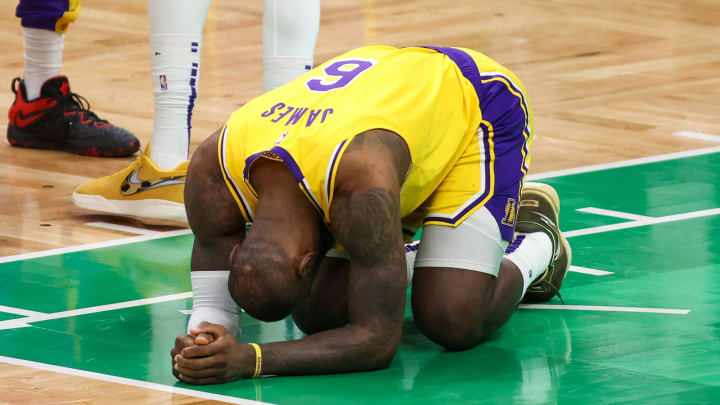LeBron and the Lakers Can’t Let the Bad Calls Linger

In this story:
Judging by the outpouring of anger from fans, the on-court reaction, the calls for investigations, and the subsequent dramatic tweeting, you would think the Lakers were the first team in history to lose on a bad officiating call.
Yes, the Lakers were robbed on Saturday night, when LeBron James was clearly fouled on a game-winning layup attempt in regulation against the Celtics, with the non-call allowing the Celtics to secure a win in overtime. It was also a little bit much over the next 24 hours to see the NBA officials’ Twitter account say there would be “sleepless nights” over the miss, and for James to publicly lament a series of iffy and/or missed fouls that have gone against the Lakers the last couple of weeks. Los Angeles may be mired in a particularly unlucky stretch of having these 50-50 decisions go against it. At the same time, the Lakers can’t let officiating issues obfuscate the team’s real problems.
I understand why the bad calls have to be tough for the Lakers. In addition to the hack by Tatum, recently there has also been an uncalled foul on a Kendrick Nunn potential winner, and iffy, late-game non-calls on Joel Embiid and Christian Wood. For a Los Angeles team only two games in the loss column behind the fourth-place Clippers, every game is high stakes. And the Lakers have been banging on the door of playoff respectability all season. If a few breaks go their way, the Lakers could be the fourth seed right now. Instead, they are 13th, three and a half games behind fourth.
The thing is, with most teams 50 games or so into the season, everyone can use that piece of reasoning. If there’s one positive to the 82-game season, it’s that gripes tend to even out over the course of time. Teams on the wrong end of bad calls are on the right end plenty of times as well. Are we really going to investigate every Lakers Last Two Minute Report and retroactively assign wins and losses? What about the nights they benefited from mistakes?
- LeBron James Point Tracker: Follow his chase for top scorer.
You want to know a bigger reason why the Lakers lost on Saturday? It’s an issue James mentioned after the first game of the season: Shooting. Los Angeles shot 12-of-42 from three against Boston, a bricky 28.6%. LeBron hit 6-of-12 himself. Late in the fourth quarter, the Celtics smartly short-circuited Los Angeles’s offense by putting Malcolm Brogdon on Anthony Davis. The Lakers couldn’t take advantage, though. If Davis posted up, Boston would ignore whoever was in the corners and practically triple team AD and shut off the paint. If AD set a screen, the Celtics could easily switch. It took a few possessions for Los Angeles to adjust, but the team lost valuable chances to score trying to figure out that look. And Darvin Ham was searching for answers in the fourth quarter and OT, trying out all three of Troy Brown Jr., Rui Hachimura and Russell Westbrook as an option in the closing five. These games wouldn’t be coming down to the last play and the referees’ whistles if the Lakers had a better chance to execute in high-leverage moments.
LeBron and the Lakers are reasonably frustrated. It’s been a trying season. The team has fought through injuries. After a horrid start, the Lakers are also way closer to a playoff spot than most imagined they would be, thanks in large part to LeBron. Los Angeles’s resilience is impressive. And so it has to be extra devastating to lose close games against good teams when every win counts and the limits of the roster are being maximized. But the Lakers can’t let this rough patch of calls define their current plight. If anything, with all the close games and the trade deadline a little over a week away, Los Angeles clearly needs just a little more help to get this group over the hump.

Rohan Nadkarni covers the NBA for SI.com. The Mumbai native and resident fashion critic has written for GQ.com, Miami Herald and Deadspin.